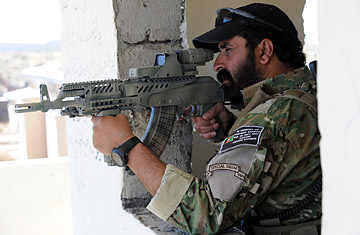
Azizullah, in Afghanistan's Paktika province on Sept. 23, 2010, leads a ferocious 400-man militia of Afghan security guards
On Nov. 30, 2009, in the shadow of mountains that crumple up 9,000-ft. ridges, an Afghan mercenary bankrolled by the U.S. military and hell-bent on the destruction of Taliban rebels allegedly stopped three men heading home to celebrate 'Id ul-Qurban with their families. According to an elder from Bermal, the Afghan district where the incident took place, Commander Azizullah and his men bound their hands. Then, the elder told TIME, Azizullah drew his pistol and shot them. There was no evidence that these men were insurgents, the elder says. "But he killed them anyway."
The story, corroborated almost word for word by an internal U.N. report dated January 2010 and calling for Azizullah's removal from the U.S. payroll, is one of numerous accounts of atrocity laid at his door. As part of a secretive U.S. Army program responsible for some of the most effective fighters in Afghanistan, Azizullah has risen from nothing to command a ferocious 400-man militia of Afghan security guards. Stocky, bearded and seemingly implacable, he's credited with bringing some kind of security to a few square miles of southeastern Afghanistan. "[I've] conducted lots of operations, seen lots of stuff, been blown up by a suicide bomber," he told TIME during a phone call earlier this year. But if testimony from four Afghan sources in Bermal, two businessmen with interests in Bermal, two Afghan officials and two Western diplomats is to be believed, the cost has been a spate of bloodletting that makes little distinction between enemy combatants and ordinary civilians — despite legislation forbidding U.S. taxpayer dollars from funding units where there is credible evidence of human-rights violations.
The U.N. report cites seven other instances in which Azizullah and his men appear to have overstepped the bounds of their authority. In late September or early October (the Afghan month of Mizan) 2009, they searched a house "belonging to Ahmad Gul" following a clash with insurgents. Gul "was killed in his home along with his brother Omer Khan" and a third person, who had been working the fields nearby. Azizullah strapped "their bodies to the hood of [his] vehicles" and paraded them through the Margha Mandi bazaar — in a country where burial rites hold deep cultural import. "The bodies were kept for eight days until they started to rot," the U.N. report claims. A maulawi (a senior cleric) from Bermal gives a similar account, placing the event in early October 2009 and naming the third victim as Mir Nawab, although rather than tilling a field, he says, Nawab was helping Gul build a mud wall. "Witnesses say the Taliban were nowhere near there and the ambush was far away," the maulawi told TIME.
In another incident detailed in the U.N. report and corroborated by two independent Afghan sources from Bermal, Azizullah and his men raided a house in Tangarhi village, "killing all nine people there," according to a Waziri elder from the district, who added that the names of three of the victims were Ajab Khan, Salaam and Gul Nawaz. According to the U.N. report, three other victims were children. A former schoolteacher from Bermal tells TIME: "Somebody reported to Azizullah that the house owner had hosted insurgents. That was wrong. His guests had come from Dubai. So Azizullah ... was supposed to arrest and detain the people so he could investigate them. But what he did was open fire."
There are a dozen similar examples, including a rape, theft and the desecration of a mosque, some related to TIME by terrified villagers during an investigation lasting several months, others painstakingly documented by U.N. officials in two separate internal reports seen by this reporter. "Elders from a number of districts in the area have provided independent accounts of Azizullah's involvement in criminal activities (theft), indiscriminate killings and ... detaining young boys [and] reportedly sexually abus[ing] them," the January 2010 report complains. It identifies Azizullah as "an Afghan Security Guard employed by SOF [special-operations forces]" and recommends that he be stripped of his position. WikiLeaked battlefield reporting also identifies Azizullah as an Afghan security guard.
Meanwhile, an assessment carried out for a reconstruction firm working in the region credits the fear and loathing Azizullah has inspired with driving civilians toward the insurgency. "The presence of Azizullah as the head of militia has led to better security, but the rural population voices serious concerns about the disproportionate and indiscriminate use of force by his men," it says. "People in Pirkuti have joined the Taliban because of Azizullah's atrocities ... Azizullah uses his rapport with the Special Forces to bomb the [Pashtun] areas ... Azizullah's security measures in rural areas have been counterproductive because of his disproportionate and indiscriminate use of force." According to the assessment, "He killed an old woman in Pirkuti because he thought she was the mother of a suspected insurgent ... These acts are amplified by the insurgents to increase disaffection for the state." The concern that U.S. sponsorship of Azizullah is driving civilians toward the insurgency is repeated by a local Afghan analyst. "The Americans are the ones to blame," he says, echoing a pervasive sentiment. "They could stop him, but they don't."
They've certainly had the opportunity. U.N. officials raised their concerns about Azizullah over a year ago. But a NATO spokesman says the organization's informal investigation of their protégé led nowhere. "There was a derogatory report via U.N. channels last summer, but when we tried to research it, there was really little information to substantiate what were essentially claims," Lieut. Colonel John Dorrian, chief of operations at NATO's public-affairs unit in Kabul, told TIME earlier this year. "Thus, no action was taken."
